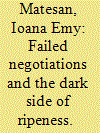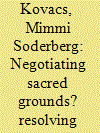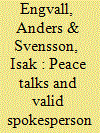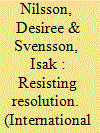| Srl | Item |
| 1 |
ID:
173737


|
|
|
|
|
| Summary/Abstract |
This article revisits ripeness theory and examines whether conflicts with armed Islamist groups can also be ripe for negotiation. The article argues that armed Islamist organizations can be willing to negotiate and demobilize, but talks are particularly vulnerable to spoilers and public backlash. To examine these dynamics, the article investigates the case of al-Gama’a al-Islamiyya in Egypt. Relying on a variety of primary and secondary sources, including organizational documents and testimonies by the leaders, the analysis shows that the absence of ripeness can indeed explain some of the failures of negotiations. However, when the conflict was finally ripe, talks broke down because of elite divisions and public backlash. The case reveals that there is a dark side to ripeness: the conditions that lead to a mutually hurting stalemate can also lead to public outrage, elite divisions, and opposition to negotiations.
|
|
|
|
|
|
|
|
|
|
|
|
|
|
|
|
| 2 |
ID:
173736


|
|
|
| 3 |
ID:
173733


|
|
|
|
|
| Summary/Abstract |
Under what conditions can Islamist armed conflicts be resolved through peace negotiations? Armed conflicts involving Islamist groups have emerged as one of the most pressing challenges on the global agenda for peace and security. But the track record of conflict resolution in these settings is not encouraging. While armed conflicts have generally decreased in the post-Cold War period, as many prolonged civil wars were resolved through negotiated settlements, this has not been true to the same extent for this sub-category of conflicts. Yet, we know surprisingly little about why this is the case. The purpose of this thematic issue is to address this gap. Each contributor tackles a different angle of the overarching research problem.
|
|
|
|
|
|
|
|
|
|
|
|
|
|
|
|
| 4 |
ID:
173738


|
|
|
|
|
| Summary/Abstract |
There have been several attempts to find negotiated solutions to the armed conflicts in Southern Thailand. Yet, these attempts of accommodation and mediated peace negotiations were aborted without any concrete results, with the exception of a formal peace process being officially launched in 2013. What explains the readiness of the parties to the conflict to enter negotiations at this stage, but not at earlier attempts? We argue that the political context can help to explain why some negotiation attempts result in negotiations, whereas others do not. We analyze the factors behind the readiness of the two sides – the Thai state and the Patani separatist insurgency – to sit down for official peace negotiations, focusing on the presence of valid spokespersons, which is an understudied element of ‘ripeness’. This case demonstrates that the problem of finding valid spokespersons may be an obstacle for peace processes especially in religiously defined conflicts.
|
|
|
|
|
|
|
|
|
|
|
|
|
|
|
|
| 5 |
ID:
173734


|
|
|
|
|
| Summary/Abstract |
The prevalence of Islamist armed conflicts is an important problem of our time. One pivotal question that remains unexplored is whether conflicts fought over Islamist claims are more or less likely to be negotiated, and if so, why? This paper provides the first large-N study exploring the relationship between Islamist claims and negotiations in all intrastate armed conflicts for the time period 1975–2011. We argue that the transnational dimension can serve to make some Islamist conflicts resistant to peaceful resolution attempts. Our findings show that while conflicts over Islamist claims generally are no more likely to see negotiations, there is significant variation within this category. When we disaggregate Islamist conflicts, we find that transnational Islamist conflicts are less likely to experience negotiations, whereas conflicts fought over separatist or revolutionary Islamist claims are no more likely to see negotiations.
|
|
|
|
|
|
|
|
|
|
|
|
|
|
|
|
| 6 |
ID:
173735


|
|
|
|
|
| Summary/Abstract |
Is religion the main reason why negotiations with Islamists fail? Contemporary international relations literature views compromise over religious claims as being particularly difficult compared to other types of claims. Religious conflicts are understood as unique phenomena. Do religious factors explain why successful conflict resolution attempts with Islamists are more difficult to achieve than with other insurgent groups who pursue non-religious claims? This article examines the case of the Pakistani Taliban and the types of demands they have made during peace talks and in their communications. The role of religion is examined in this article and, specifically, theories of scarce resources, indivisibility and securitization are analyzed to explain the difficulties of negotiating with Islamists.
|
|
|
|
|
|
|
|
|
|
|
|
|
|
|
|